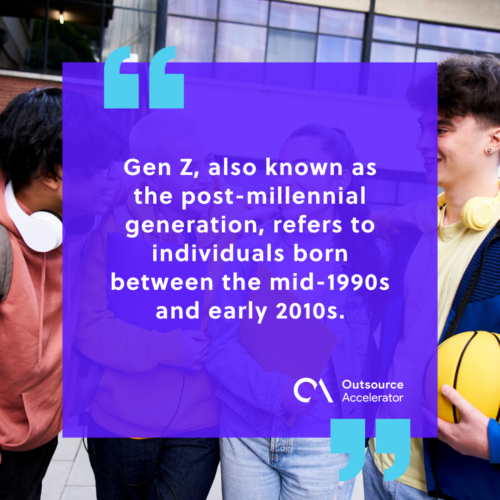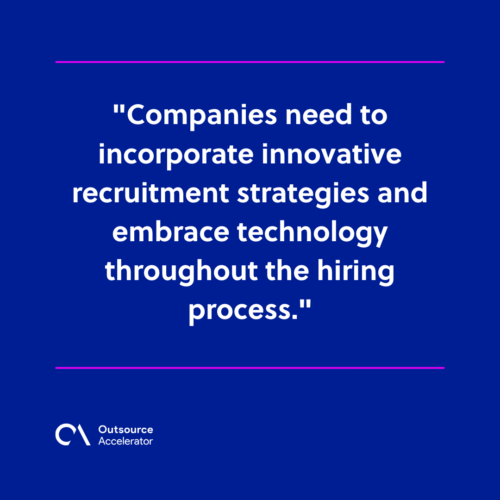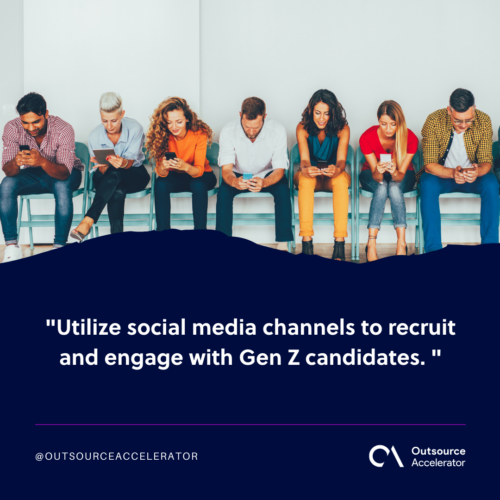Here’s what you should know about hiring Gen Z

As we navigate the terrain of hiring and talent acquisition, it is crucial to understand the unique characteristics and preferences of each generation.
Gen Z, the cohort born between the mid-1990s and early 2010s, brings a fresh and dynamic perspective to the table.
With their innate understanding of technology and a desire to make a meaningful impact, Gen Z individuals possess unique traits that can propel businesses to new heights.
By tapping into their strengths and customizing recruitment strategies, firms can attract and retain the best Gen Z candidates.
Let’s explore the facets of hiring Gen Z, the post-millennial generation that will dominate the workforce in 2024.
Hiring Gen Z in 2024
Gen Z, also known as the post-millennial generation, refers to individuals born between the mid-1990s and early 2010s. Representing 30% of the global population, this generation is expected to comprise around 27% of the global workforce by 2025.
As an employer, attracting, recruiting, and retaining Gen Z talent requires a different approach than attracting talent from other generations.
Hiring Gen Z vs. Hiring Millennials
While millennials are known for their desire for work-life balance and meaningful work, Gen Z tends to prioritize stability, financial security, and career progression.
Gen Z individuals are more pragmatic, seeking clear career paths and tangible outcomes. Understanding these differences will enable you to align your recruitment strategies with Gen Z candidates’ expectations and motivations.

Misconceptions about hiring Gen Z workers
There are a lot of misconceptions about hiring Gen Zs that have been debunked for the past years. Let’s address some of these misconceptions:
Gen Zs are job-hoppers
One common misconception about Gen Z workers is that they tend to switch jobs frequently.
It is true that Gen Z individuals are generally more open to exploring different opportunities. However, they are also highly motivated by stability and growth.
By providing clear upskilling paths, mentorship programs, and opportunities for continuous learning, you can foster a sense of loyalty and engagement among Gen Z employees.
Gen Zs tend to be lazy and unmotivated
Contrary to popular belief, Gen Z workers are not lazy or unmotivated.
They are, in fact, extremely driven and have a strong desire to make a meaningful impact. However, their definition of success may differ from previous generations.
Gen Z individuals often seek work environments where they can collaborate, innovate, and contribute their unique perspectives. By creating an inclusive and empowering workplace culture, you can harness their potential and drive optimal performance.
Gen Zs have unrealistic demands at work
Another misconception is that Gen Z employees have unrealistic demands at work. While they do value work-life balance and flexibility, they are also realistic and pragmatic.
Gen Zs understand the importance of hard work and are willing to put in the effort to achieve their goals.
By offering a fair and competitive compensation package, along with opportunities for growth and development, you can attract and retain top Gen Z talent.
Challenges and opportunities in hiring Gen Z
Challenges
When it comes to hiring Gen Z workers, several challenges may arise:
Adapting to technological advancements
Gen Z individuals are true digital natives, having grown up with advanced technology. Companies need to incorporate innovative recruitment strategies and embrace technology throughout the hiring process.

Addressing attention spans
Gen Z tends to experience information overload, causing their attention spans to shorten. Employers must find creative ways to maintain their attention and present compelling opportunities.
Balancing collaboration
Gen Z individuals value independence, but they also thrive in collaborative environments. Finding ways to balance their desire for autonomy with team collaboration is crucial.
Opportunities
While there are challenges, there are also numerous opportunities when it comes to hiring Gen Z workers.
Harnessing their tech-savviness
Gen Z individuals can bring fresh perspectives and innovative ideas to the table. Leveraging their knowledge of technology can drive digital transformation and help companies stay ahead of the curve.
Promoting diversity and inclusion
Gen Z is the most diverse generation in history. By fostering a culture of inclusivity and embracing diversity, organizations can attract and retain top Gen Z talent.
Embracing their entrepreneurial mindset
Many Gen Z individuals have an entrepreneurial spirit. Harnessing their drive and ambition can lead to increased innovation and growth within the company.
Best practices in hiring Gen Z
Hiring Gen Z workers requires understanding their unique characteristics, dispelling misconceptions, and adapting recruitment strategies to align with their expectations.
By addressing challenges and implementing best practices, organizations can attract and retain the future’s top talent.
To effectively hire Gen Z workers, consider these best practices:
Emphasize career development opportunities
Gen Z individuals value career progression. To attract and retain top talent, highlight opportunities for growth, mentorship, and professional development.
Leverage social media and digital platforms
Utilize social media channels to recruit and engage with Gen Z candidates. Showcase your company culture, values, and employee experiences to pique their interest.

Offer a flexible work environment
Gen Zs value flexibility and work-life balance. To accommodate their preferences, consider implementing flexible work arrangements and remote work options.
Provide ongoing feedback and recognition
Regular feedback and recognition are essential for Gen Z employees. Implement a feedback culture and acknowledge their achievements to foster motivation and engagement.
Foster a culture of innovation and collaboration
Create a work environment that encourages innovative thinking and collaboration. Gen Z individuals thrive in spaces where they can contribute their ideas and make a meaningful impact.







 Independent
Independent




